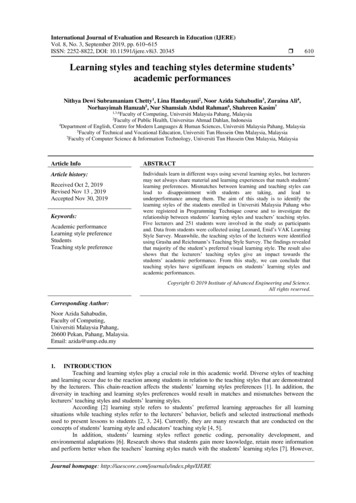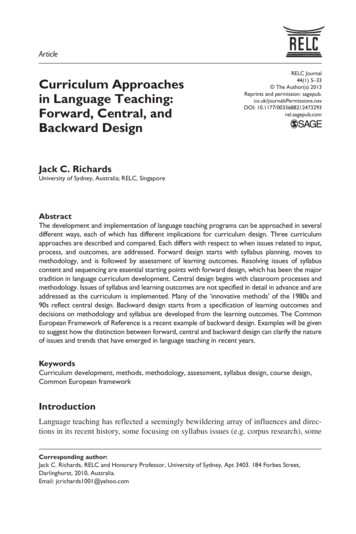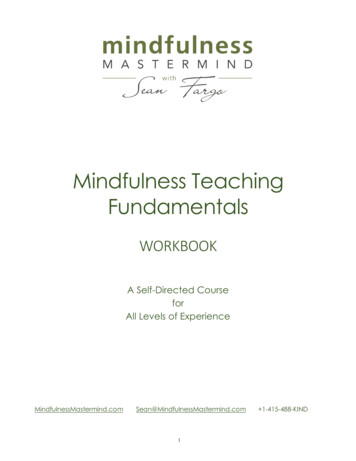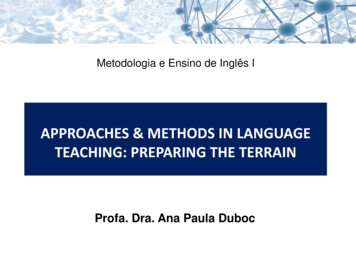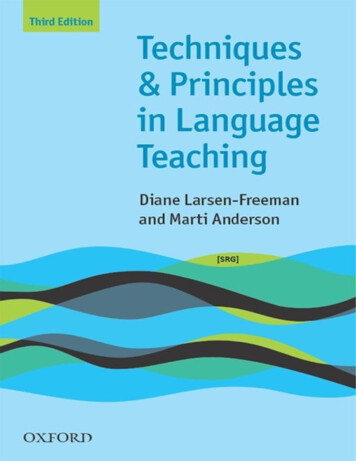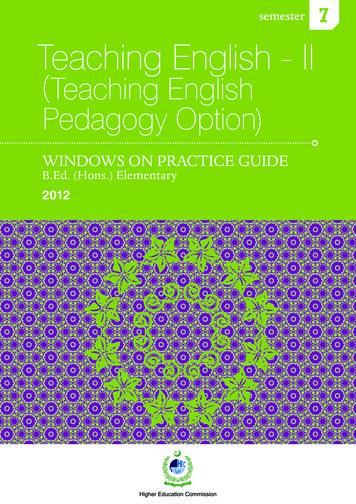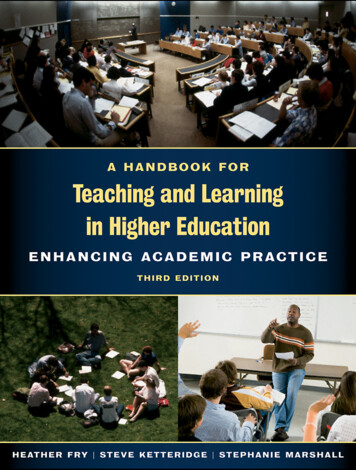
Transcription
A Handbook for Teaching and Learningin Higher EducationA Handbook for Teaching and Learning in Higher Education is sensitive to the competingdemands of teaching, research and scholarship, and academic management. Against thesecontexts, the book focuses on developing professional academic skills for teaching.Dealing with the rapid expansion of the use of technology in higher education andwidening student diversity, this fully updated and expanded edition includes newmaterial on, for example, e-learning, lecturing to large groups, formative and summativeassessment, and supervising research students.Part 1 examines teaching and supervising in higher education, focusing on a range ofapproaches and contexts.Part 2 examines teaching in discipline-specific areas and includes new chapters onengineering, economics, law, and the creative and performing arts.Part 3 considers approaches to demonstrating and enhancing practice.Written to support the excellence in teaching required to bring about learning of thehighest quality, this will be essential reading for all new lecturers, particularly anyonetaking an accredited course in teaching and learning in higher education, as well as allthose experienced lecturers who wish to improve their teaching. Those working in adultlearning and education development will also find it a particularly useful resource.Heather Fry is the founding Head of the Centre for Educational Development at ImperialCollege London.Steve Ketteridge is Director of Educational and Staff Development at Queen Mary,University of London.Stephanie Marshall is Director of Programmes at the Leadership Foundation for HigherEducation and is currently Visiting Professor at Queen Mary, University of London.
A Handbook for Teaching andLearning in Higher EducationEnhancing Academic PracticeThird editionEdited byHeather FrySteve KetteridgeStephanie Marshall
First edition published 1999Second edition published 2003by RoutledgeThis edition published 2009by Routledge270 Madison Ave, New York, NY 10016Simultaneously published in the UKby Routledge2 Park Square, Milton Park, Abingdon, Oxon OX14 4RNRoutledge is an imprint of the Taylor and Francis Group, an informa businessThis edition published in the Taylor & Francis e-Library, 2008.“To purchase your own copy of this or any of Taylor & Francis or Routledge’scollection of thousands of eBooks please go to www.eBookstore.tandf.co.uk.” 2003 individual contributors; 2009 Taylor & FrancisAll rights reserved. No part of this book may be reprinted or reproducedor utilised in any form or by any electronic, mechanical, or other means,now known or hereafter invented, including photocopying and recording,or in any information storage or retrieval system, without permissionin writing from the publishers.Trademark Notice: Product or corporate names may be trademarks orregistered trademarks, and are used only for identification and explanationwithout intent to infringe.Library of Congress Cataloging in Publication DataA handbook for teaching and learning in higher education : enhancing academicpractice / [edited by] Heather Fry, Steve Ketteridge, Stephanie Marshall.–3rd ed.p. cm.Includes bibliographical references and index.1. College teaching–Handbooks, manuals, etc. 2. College teachers. 3. Lecture methodin teaching. I. Fry, Heather. II. Ketteridge, Steve. III. Marshall, Stephanie. IV. Title:Teaching and learning in higher education.LB2331.H3145 2008378,1′25–dc222008009873ISBN 0-203-89141-4 Master e-book ISBNISBN 10: 0–415–43463–7 (hbk)ISBN 10: 0–415–43464–5 (pbk)ISBN 10: 0–203–89141–4 (ebk)ISBN 13: 978–0–415–43463–8 (hbk)ISBN 13: 978–0–415–43464–5 (pbk)ISBN 13: 978–0–203–89141–4 (ebk)
ContentsList of illustrationsNotes on Part 1 Teaching, supervising and learning in higher education11A user’s guideHeather Fry, Steve Ketteridge and Stephanie Marshall32Understanding student learningHeather Fry, Steve Ketteridge and Stephanie Marshall83Encouraging student motivationSherria L. Hoskins and Stephen E. Newstead274Planning teaching and learning: curriculum design and developmentLorraine Stefani405Lecturing to large groupsAnn Morton586Teaching and learning in small groupsSandra Griffiths727E-learning – an introductionSam Brenton85 v
vi Contents8 Teaching and learning for employability: knowledge is not the only outcomePauline Kneale9 Supporting student learningDavid Gosling9911310 Assessing student learningLin Norton13211 Supervising projects and dissertationsStephanie Marshall15012 Supervising research studentsSteve Ketteridge and Morag Shiach16613 Teaching quality, standards and enhancementJudy McKimm18614 Evaluating courses and teachingDai Hounsell198Part 2 Teaching in the disciplines21315 Teaching in the disciplinesDenis Berthiaume21516 Key aspects of learning and teaching in experimental sciencesIan Hughes and Tina Overton22617 Key aspects of teaching and learning in mathematics and statisticsJoe Kyle and Peter Kahn24618 Key aspects of teaching and learning in engineeringJohn Dickens and Carol Arlett26419 Key aspects of teaching and learning in computing scienceGerry McAllister and Sylvia Alexander28220 Key aspects of teaching and learning in arts, humanities andsocial sciencesPhilip W. Martin300
Contents vii21 Key aspects of teaching and learning in languagesCarol Gray and John Klapper32322 Key aspects of teaching and learning in the visual artsAlison Shreeve, Shân Wareing and Linda Drew34523 Key aspects of teaching and learning: enhancing learning inlegal educationTracey Varnava and Julian Webb36324 Key aspects of teaching and learning in accounting, businessand managementUrsula Lucas and Peter Milford38225 Key aspects of teaching and learning in economicsLiz Barnett40526 Key aspects of teaching and learning in medicine and dentistryAdam Feather and Heather Fry42427 Key aspects of teaching and learning in nursing and midwiferyPam Parker and Della Freeth449Part 3 Enhancing personal practice46728 Enhancing personal practice: establishing teaching andlearning credentialsHeather Fry and Steve Ketteridge46929 Teaching excellence as a vehicle for career progressionStephanie Marshall and Gus PenningtonGlossaryIndex485499513
e Kolb Learning CycleThe logical model of curriculum developmentA modification to Cowan’s earlier modelViews of the curriculumSupervisor–supervisee relationship in project supervisionSources and methods of feedbackThe evaluation cycleModel of discipline-specific pedagogical knowledge (DPK) foruniversity teaching24.1 The ‘for–about’ spectrum in business education24.2 Shifting the focus along the ‘for–about’ spectrum26.1 PBL at St 23.13.23.34.15.17.19.110.112.1Learning stylesClassification of academic knowledgeReasons for studyingPercentage of students agreeing with questions on the ASSIST scaleMotivational generalisations and design principlesThe University of Auckland: graduate profileEmphasising the structure of lectures using signals and cluesHypothetical teaching situations and possible e-learning responsesQuestions students ask themselvesCharacteristics of grades A, B and CUniversity of East Anglia: full-time research degrees viii 1920283235–36426289–90118140168
Illustrations12.215.1Doctoral qualifications obtained in the UK, 2001 to 2005Dimensions associated with components of the knowledge basefor teaching15.2Dimensions associated with components of disciplinary specificity15.3Dimensions associated with components of the personalepistemology23.1Skills and cognitive levels assessed by law coursework andexaminations24.1A critical reading framework for empirical academic papers28.1A The UK Professional Standards Framework28.1B Areas of activity, knowledge and values within the Framework ix170219–221221222376397470471
ContributorsTHE EDITORSHeather Fry is the founding Head of the Centre for Educational Development atImperial College London. After teaching and lecturing in Nigeria she worked at theInstitute of Education, London, and the Barts and Royal London School of Medicineand Dentistry at Queen Mary, University of London. She teaches, researches andpublishes on academic practice in higher education. Her particular passions are howteaching, curriculum organisation and manipulation of ‘context’ can support andexpand learning, especially in medical and surgical education. She has also beeninvolved in the development of several innovative programmes including a Master’sin Surgical Education and another in University Learning and Teaching.Steve Ketteridge is the first Director of Educational and Staff Development at QueenMary, University of London. His academic career began with a university lectureshipin microbiology. Subsequently he established the Postgraduate Certificate in AcademicPractice at Queen Mary and has developed strategy in areas such as learning andteaching, skills and employability. He is a key reference point on supervision ofdoctoral students in science and engineering, and advises universities and researchinstitutes across the UK. Recently he has been involved in international work on thedevelopment of performance indicators for university teaching.Stephanie Marshall is Director of Programmes at the Leadership Foundation for HigherEducation, where she has worked since 2003, and is currently Visiting Professor atQueen Mary, University of London. Prior to this, she worked at the University of York,where she taught and researched in the Department of Educational Studies, movingon to set up the university’s first Staff Development Office. Subsequently she becamethe Provost of Goodricke College, and worked in the Centre for Leadership andManagement. She has published widely. x
Contributors xiTHE AUTHORSSylvia Alexander is Director of Access and Distributed Learning at the University ofUlster. She has a wide knowledge of current practice in teaching, learning andassessment resulting from previous involvement in a variety of national initiativesincluding the Higher Education Academy.Carol Arlett is the Manager for the Engineering Subject Centre and oversees the Centre’srange of activities that aim to provide subject-specific support for engineeringacademics. She has a particular interest in employer engagement and skills development.Liz Barnett is Director of the London School of Economics (LSE) Teaching and LearningCentre. At the LSE she has collaborated with colleagues both in supporting graduateteaching assistants and encouraging innovatory teaching approaches. She previouslyworked at the University of Southampton and has lectured on international health.Denis Berthiaume is Director of the Centre for Learning and Teaching at the Universityof Lausanne, Switzerland. His research interests include discipline-specific teaching inhigher education, reflective practice in teaching, and the assessment of learning inhigher education.Sam Brenton is Head of E-Learning at Queen Mary, University of London. He isparticularly interested in the social uses and effects of new media and virtual worlds.He has been an author, broadcaster, critic, journalist, poet and educational developer.John Dickens is Director of the Engineering Subject Centre. He is also Professor ofEngineering Education, Associate Dean (Teaching) for the Faculty of Engineering, andDirector of the Engineering Centre for Excellence in Teaching and Learning (CETL) atLoughborough University. He has 25 years of teaching experience in civil and structuralengineering design and received a National Teaching Fellowship in 2006.Linda Drew is the Dean of Academic Development at the University of the Arts London,UK. Linda is founding editor of the journal Art, Design and Communication in HigherEducation. She is also a Fellow and Vice-chair of the Design Research Society and Vicechair of the Group for Learning in Art and Design.Adam Feather is a Consultant Geriatrician at Newham University Hospital Trust and aSenior Lecturer in Medical Education at Barts and The London, Queen Mary’s Schoolof Medicine and Dentistry. He is married to the most understanding woman in theworld and has a Weapon of Mass Destruction, aged 4.Della Freeth is Professor of Professional and Interprofessional Education withinCity Community and Health Sciences, contributing to the CETL on Clinical andCommunication Skills developed jointly by City University and Queen Mary,University of London.
xii ContributorsDavid Gosling has written widely on topics relating to learning and teaching in highereducation and in applied philosophy. Formerly Head of Educational Development atthe University of East London, he is now Visiting Research Fellow at the University ofPlymouth. He works as an independent consultant with many universities in the UKand internationally.Carol Gray is Senior Lecturer in Modern Languages in Education, University ofBirmingham. She is involved in the development of initial and in-service training formodern languages and publishes on a range of related topics.Sandra Griffiths was formerly a Senior Lecturer in Education at the University of Ulster.She has wide experience of supporting and researching learning and teaching and ofdeveloping, teaching, reviewing and consulting globally on postgraduate certificatesfor university teachers. She is President of the All-Ireland Society for Higher Educationand a member of the International Council for Educational Development. In 2005 shewas awarded a National Teaching Fellowship.Sherria L. Hoskins is a Principal Lecturer at the University of Portsmouth where she isCourse Leader for the B.Sc. Psychology and an operational member of the ExPERT(Excellence in Professional Development through Education, Research andTechnology) CETL. In 2004 she was awarded a University Learning and TeachingFellowship. She is an active researcher, focusing on social cognitive aspects of learningsuccess, from school to university and beyond.Dai Hounsell is Professor of Higher Education at the University of Edinburgh andpreviously Director of the Centre of Teaching, Learning and Assessment at thatuniversity. He publishes and advises widely on teaching and learning matters.Ian Hughes is a National Teaching Fellow, Professor of Pharmacology Education,University of Leeds, and has directed the Higher Education Academy Centre forBioscience, as well as other EU and UK projects, for example developing educationalsoftware.Peter Kahn is Educational Developer in the Centre for Lifelong Learning at the Universityof Liverpool. He publishes widely on teaching and learning in higher education, andis co-editor (with Joe Kyle) of Effective Learning and Teaching in Mathematics and itsApplications, also published by Routledge.John Klapper is a Professor and Director of the Centre for Modern Languages, Universityof Birmingham, where he also teaches in German Studies. He is a National TeachingFellow and publishes widely on various aspects of foreign language pedagogy andteacher development.Pauline Kneale is Professor of Applied Hydrology with Learning and Teaching inGeography at the University of Leeds. She became a National Teaching Fellow in 2002and is well known in the UK for her work on curriculum development and studentemployability.
Contributors xiiiJoe Kyle was formerly Senior Lecturer and Director of Learning and Teaching inthe School of Mathematics and Statistics at Birmingham University. Mathematicscoordinator for the Higher Education Academy Mathematics, Statistics andOperational Research Network, he is an editor of Teaching Mathematics and itsApplications.Ursula Lucas is Professor of Accounting Education at Bristol Business School, Universityof the West of England. Her research interests are in the development of a reflectivecapacity within higher education and workplace learning. In 2001 she was awarded aNational Teaching Fellowship.Gerry McAllister holds a B.Sc. and M.Sc. in Electronic Engineering and Ph.D. inComputer Science. He is currently Director of the Subject Centre for Information andComputer Sciences at the University of Ulster, where he is Professor of ComputerScience and Head of the School of Computing and Mathematics.Judy McKimm works at the Centre for Medical and Health Sciences Education,University of Auckland, New Zealand. She was formerly a Visiting Professor at theUniversity of Bedfordshire. She has a long-standing interest and involvement in qualityenhancement.Philip W. Martin is Pro Vice-chancellor of De Montfort University. He has responsibilityfor Academic Quality and for all Learning and Teaching across the university. His remitalso includes the student experience. He is a Professor of English and was formerlyDirector of the English Subject Centre (for the teaching of English in universities) atRoyal Holloway, University of London.Peter Milford is Interim Associate Director of Education for the South West StrategicHealth Authority. Before rejoining the NHS in 2002, he was a Principal Lecturerin Accounting and Finance at Bristol Business School, University of the West ofEngland.Ann Morton is Head of Staff Development at Aston University. She was previouslyProgramme Director for the Postgraduate Certificate in Learning and Teaching at theUniversity of Birmingham and continues to teach on the similar programme for newlecturers at Aston.Stephen E. Newstead is Professor of Psychology at the University of Plymouth, thoughrecently he has ventured into management territory as Dean, Deputy Vice-Chancellorand even Vice-Chancellor. Back in the days when he had time to do research, hisinterests focused on cognitive psychology and the psychology of higher education,especially student assessment.Lin Norton is a National Teaching Fellow (2007), Professor of Pedagogical Research andDean of Learning and Teaching at Liverpool Hope University. Her research interestsinclude student assessment which she pursues through her role as Research Directorof the Write Now CETL.
xiv ContributorsTina Overton is Professor of Chemistry Education at the University of Hull and Directorof the Higher Education Academy Physical Sciences Centre. She has published oncritical thinking, context-based learning and problem solving.Pam Parker spent many years in the School of Nursing and Midwifery, City University,focusing on learning, teaching, assessing and curriculum development. She isnow co-director of CEAP (Centre for Education and Academic Practice) at CityUniversity.Gus Pennington now works as a consultant in the areas of change management andquality enhancement. He is Visiting Professor at Queen Mary, University of London,and a former chief executive of a national agency for promoting professionaldevelopment throughout the UK higher education sector.Morag Shiach is Vice-principal (Teaching and Learning) at Queen Mary, University ofLondon. She has extensive experience of supervising research students and ofexamining doctoral dissertations in English and cultural history. She has publishedwidely on cultural history, particularly in the modernist period.Alison Shreeve is Director of the Creative Learning in Practice CETL at the University ofthe Arts London, UK. She is currently engaged in doctoral research investigating theexperience of the practitioner tutor in art and design.Lorraine Stefani is Director of the Centre for Academic Development at the Universityof Auckland, New Zealand. Her particular interests are curriculum design anddevelopment for a twenty-first-century university education; innovative strategies forassessment of student learning, and institutional strategies to promote studentengagement.Tracey Varnava is Associate Director of the UK Centre for Legal Education, the HigherEducation Academy Subject Centre for Law based at the University of Warwick. Beforemoving to Warwick, she was a Lecturer in Law at the University of Leicester.Shân Wareing is Dean of Learning and Teaching Development at the University of theArts London, UK, where she leads the Centre for Learning and Teaching in Art andDesign. She is also a Fellow and Co-Chair of the Staff and Educational DevelopmentAssociation.Julian Webb is Director of the UK Centre for Legal Education and Professor of LegalEducation at the University of Warwick, where he also leads the UK’s only Master’sdegree in Legal Education.Case study authorsChapter authors who have written case studies have not been re-listed. Nationalattribution has been assigned if outside the UK. Academic titles and departments can befound within the case studies.
ContributorsJulie Attenborough, City UniversityJuan Baeza, now King’s College LondonSimon Bates, University of EdinburghMick Beeby, University of the West of EnglandSimon Belt, University of PlymouthPaul Blackmore, now King’s College LondonChris Bolsmann, Aston UniversityMelanie Bowles, University of the Arts LondonJim Boyle, University of StrathclydeMargaret Bray, London School of Economics and Political ScienceDavid Bristow, Peninsula Medical SchoolPeter Bullen, University of HertfordshireLiz Burd, University of DurhamChristopher Butcher, University of LeedsRachael Carkett, now at University of TeessideHugh Cartwright, Oxford UniversityMarion E. Cass, Carleton College, USATudor Chinnah, Peninsula Medical SchoolElizabeth Davenport, Queen Mary, University of LondonMatt Davies, Aston UniversityRussell Davies, Peninsula Medical SchoolVal Dimmock, City UniversityRoberto Di Napoli, Imperial College LondonCaroline Elliott, University of LancasterJohn Fothergill, University of LeicesterAnn Gilroy, University of Auckland, NZChristopher Goldsmith, De Montfort UniversityAnne Goodman, South West and Wales Hub (Cardiff University)Nuala Gregory, University of Auckland, NZLouise Grisoni, University of the West of EnglandMick Healey, University of GloucestershireIain Henderson, Napier UniversitySarah Henderson, University of Auckland, NZSiobhán Holland, Royal Holloway, University of LondonDesmond Hunter, University of UlsterAndrew Ireland, Bournemouth UniversityTony Jenkins, University of LeedsMike Joy, University of WarwickSally Kift, University of Queensland, Australia xv
xvi ContributorsChris Lawn, Queen Mary, University of LondonJonathan Leape, London School of Economics and Political ScienceDavid Lefevre, Imperial College LondonDavid Lewis, University of LeedsIan Light, City UniversityGary Lock, University of BathLynne MacAlpine, McGill University, Canada, and University of OxfordGeorge MacDonald Ross, University of LeedsPeter McCrorie, St George’s Medical School, University of LondonNeil McLean, London School of Economics and Political ScienceKaren Mattick, Peninsula Medical SchoolCaroline Mills, University of GloucestershireEbrahim Mohamed, Imperial College LondonClare Morris, University of BedfordshireOffice of the Independent Adjudicator for Higher EducationFiona Oldham, Napier UniversityJames Oldham, Peninsula Medical SchoolAlan Patten, Princeton University, USABen Pontin, University of the West of EnglandSteve Probert, Business, Management, Accounting and Finance Subject Centre (OxfordBrookes University)Sarah Quinton, Oxford Brookes UniversityLisa Reynolds, City UniversitySarah Richardson, Warwick UniversityAndrew Rothwell, Coventry UniversityMark Russell, University of HertfordshireHenry S. Rzepa, Imperial College LondonAndrew Scott, London School of Economics and Political ScienceStephen Shute, University of BirminghamAlan Simpson, City UniversityTeresa Smallbone, Oxford Brookes UniversityAdrian Smith, Southampton UniversitySimon Steiner, formerly University of BirminghamStan Taylor, University of DurhamTanya Tierney, Imperial College LondonGuglielmo Volpe, London Metropolitan UniversityDigby Warren, London Metropolitan UniversityCharlotte K. Williams, Imperial College LondonMatthew Williamson, Queen Mary, University of London
AcknowledgementsThe editors wish to acknowledge all those who have assisted in the production of thethird edition of this handbook. We are especially grateful, as always, to our team of expertcontributing authors and those who have supplied the case studies that enrich the text.A special word of thanks is due to Mrs Nicole Nathan without whose organisationalskills and help this book would have been much longer in coming to fruition.We particularly wish to acknowledge the role of Professor Gus Pennington insupporting and encouraging the editors at all stages in the creation of the handbook andmost recently in the production of this third edition.Heather FrySteve KetteridgeStephanie Marshall xvii
ForewordIt is a pleasure to write this foreword to the third edition of the highly successfulHandbook for Teaching and Learning in Higher Education. While its contributors are mainlyBritish and there are places where it necessarily addresses a specifically British context,this is a collection which has genuine international appeal and relevance. For, acrossmuch of the globe, the world of teaching and learning in higher education is beingshaped by similar phenomena: a larger, more demanding and more diverse studentbody, a pervasive language of quality and accountability, rapidly changing technological possibilities yet uneven levels of student familiarity with them, more demandingarrangements with governments, and expectations by students and employers thatgraduates will be equipped for rapidly changing and globalising workplaces.This is a handbook which offers higher education professionals both sage advice onthe essentials of effective teaching and research-based reflection on emerging trends. Itis a precious collection of core chapters on lecturing to large groups, teaching and learningin small groups, teaching and learning for employability, assessment, and supervision ofresearch theses. At the same time, there are chapters on e-learning, effective studentsupport, and ways of providing evidence for accredited teaching certificates andpromotion, including the expanding use of teaching portfolios. Specialists from thecreative and performing arts and humanities through business and law to the physicaland health sciences will benefit from discipline-specific reflections on challenges inteaching, learning and assessing. Specific case studies, actual examples of successfulpractice, and links to helpful websites add to the Handbook’s usefulness.This is thus a volume to which young academics will turn for lucid, practical advice onthe essentials of effective classroom practice, while their experienced colleagues will findit a rich compendium of challenges to refresh their knowledge and rethink theirassumptions. Teachers and students all over the world will have cause to be grateful tothe co-editors Heather Fry, Steve Ketteridge and Stephanie Marshall, and to the score ofcontributors they have expertly assembled. Never before has there been such a need forsound but stimulating advice and reflection on teaching in higher education, and this isa splendid contribution to meeting that need.Professor Peter McPhee,Provost,University of Melbourne,Australia xviii
Part 1Teaching, supervisingand learning in highereducation
1A user’s guideHeather Fry, Steve Ketteridgeand Stephanie MarshallSETTING THE CONTEXT OF ACADEMIC PRACTICEThis book starts from the premise that the roles of those who teach in higher educationare complex and multifaceted. Teaching is recognised as being only one of the rolesthat readers of this book will be undertaking. It recognises and acknowledges thatacademics have contractual obligations to pursue excellence in several directions, mostnotably in teaching, research and scholarship, supervision, academic administration andmanagement and, for many, maintenance of standing and provision of service in aprofession (such as teaching or nursing). Academic practice is a term that encompassesall these facets.The focus of this book is on teaching and the supervision of students. The purpose ofboth of these activities, and all that is associated with them (for example, curriculumorganisation and assessment), is to facilitate learning, but as our focus is on what theteacher/supervisor does to contribute to this, we have stressed the role of the teacher inboth the title and the text of this handbook. However, effective teaching (and supervision,assessment, planning and so on) has to be predicated on an understanding of howstudents learn; the objective of the activities is to bring about learning, and there has tobe insight and knowledge about learners’ needs for teaching to be successful.The authors recognise the fast pace of change in higher education. The past decadehas seen continuing increase in student numbers, further internationalisation of thestudent population, and wider diversity in the prior educational experience of students.All these factors have placed yet more pressure on resources, requirements for incomegeneration, improved flexibility in modes of study and delivery (particularly in distanceand e-learning) and continuing scrutiny in relation to quality and standards. Commonly,academics will now work with students who are not only based on campus but also ata distance. A further challenge facing the higher education sector is the expectationto prepare students more carefully for the world of work. For many students the need totake on paid employment during term time is a financial reality. Other themes within 3
4 Teaching, supervising, learningteaching include the pressure to respond to local and national student opinion surveysof teaching and the total learning experience, compliance with the Bologna Declarationand extending the work and impact of universities out into the local community.PURPOSE OF THIS BOOKThis book is intended primarily for relatively inexperienced teachers in higher education.Established lecturers interested in exploring recent developments in teaching, learningand assessment will also find it valuable. It will be of interest to a range of staff workingin higher
widening student diversity, this fully updated and expanded edition includes new material on, for example, e-learning, lecturing to large groups, formative and summative assessment, and supervising research students. Part 1 examines teaching and supervising in higher e



